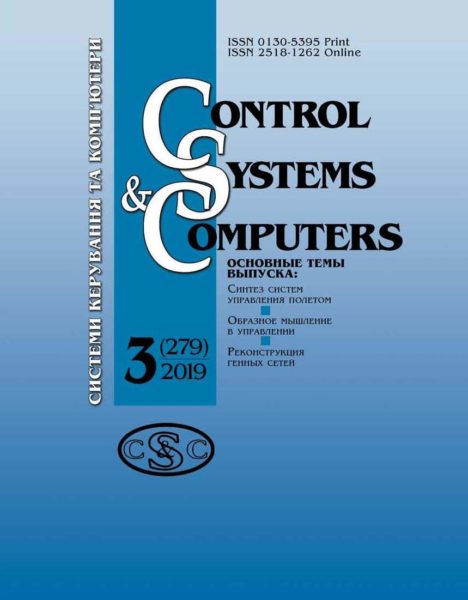Control Systems and Computers, N6, 2019, Article 3
https://doi.org/10.15407/csc.2019.06.028
Control Systems and Computers, 2019, Issue 6 (284), pp. 28-34.
UDC 681.513
Savchenko Yevgeniya A., PhD (Eng.), Senior Research Associate, International Research and Training Center for Information Technologies and Systems NAS and MES of Ukraine, Glushkov ave., 40, Kyiv, 03187, Ukraine, https://orcid.org/0000-0003-4851-9664, savchenko_e@meta.ua
Rybachok Natalia A., PhD (Eng.), Senior Lecturer, Computer Systems Software Department of the Applied Mathematics Faculty National Technical University of Ukraine “Igor Sikorsky Kyiv Politechnic Institute”, Peremohy Ave 37, Kyiv, Ukraine, https://orcid.org/0000-0002-8133-1148, rybachok@pzks.fpm.kpi.ua
Metalearning as One of the Task of the
Machine Learning Problems
The concepts of metalearning as one of tasks of machine learning are considered. The basic principles of metalearning and examples of solving problems of machine and metalearning in various fields of human activity are given. It is planned a decision support system construction based on an inductive approach for complex processes modeling and forecasting.
Download full text! (In English)
Keywords: machine learning, metalearning, inductive modelling, decision support.
- Machine learning, [cited 2017 Oct. 16]. Available from: https://en.wikipedia.org/wiki/Machine_learning.
- Machine Learning – Mashinnoye obucheniye. https://www.it.ua/ru/knowledge-base/technology-innovation/machine-learning. (In Russian).
- Machine Learning. http://www.machinelearning.ru. (In Russian).
- Gupta, A. An Introduction to Meta-Learning. https://medium.com/walmartlabs/an-introduction-to-meta-learning-ced7072b80e7.
- What is meta-learning in machine learning? https://www.quora.com/What-is-meta-learning-in-machine-learning.
- Meta-Learning: Learning to Learn Fast. https://lilianweng.github.io/lil-log/2018/11/30/meta-learning.html.
- Meta Learning. http://statsoft.ru/home/textbook/glossary/GlossaryTwo/M/MetaLearning.htm.
- Brazdil, P., Giraud-Carrier, Ch., Soares, C., Vilalta, R., 2008. “Metalearning: Applications to Data Mining”, Springer Publishing Company, Incorporated, pp. 11-31. doi:10.1007/978-3-540-73263-1.
https://doi.org/10.1007/978-3-540-73263-1 - Vilalta,P., Drissi, Y., 2002. Perspective view and overview of meta-training, artificial intelligence. Overview, 18 (2), 77-95.
https://doi.org/10.1023/A:1019956318069 - Lavrenyuk, M.S., Novikov, O.M. Ohlyad metodiv mashynnoho navchannya dlya klasyfikatsiyi velykykh obsyahiv suputnykovykh danykh. System Research & Information Technologies, 2018, № 1, pp. 52-71. DOI: 10.20535/SRIT.2308-8893.2018.1.04. (In Ukrainian).
https://doi.org/10.20535/SRIT.2308-8893.2018.1.04 - Methodology for comparing machine learning algorithms based on meta-learning. https://www.rfbr.ru/rffi/ru/project_search/o_2037109. (In Russian).
- Liu, X., Faes, L, at all., 2019. A comparison of deep learning performance against health-care professionals in detecting diseases from medical imaging: a systematic review and meta-analysis. https://www.thelancet.com/journals/landig/article/PIIS2589-7500(19)30123-2/fulltext. DOI:
https://doi.org/10.1016/S2589-7500(19)30123-2 - Flach, P., 2012. “Machine learning: the art and science of algorithms that make sense of data”, Cambridge University Press, 2012, 396 p.
- Domingos, P., 2015. The Master Algorithm: How the Quest for the Ultimate Learning Machine Will Remake Our World. USA: Basic Books, 352 p.
- Named the most liveable cities on Earth. https://www.avianews.com/
world/2018/04/10/best_cities_to_live/. (In Russian). - Orlov A.A., 2014. “Avtomaticheskaya sistema meta-obucheniya s podderzhkoy vybora optimal’nogo algoritma resheniya zadachi i vychisleniya optimal’nykh parametrov yego funktsionirovaniya”. Izvestiya tomskogo politekhnicheskogo universiteta, 5 (324), pp. 57-70. (In Russian).
- Orlov, A.V., 2014. “Models, algorithms and software platform for implementing meta-learning based on the method of group accounting of arguments”, Avtoref. dis. by specialty 05.13.18 Tomsk, 24 p. (In Russian).
- Savchenko, Y., Stepashko, V., 2018. “Metamodeling as a way to universalization of inductive modeling tools”. 2018 IEEE 13th International Scientific and Technical Conference on Computer Sciences and Information Technologies, CSIT 2018 – Proceedings. pp. 444-447.
https://doi.org/10.1109/STC-CSIT.2018.8526582 - Savchenko, Y., Stepashko, V., 2018.Metamodeling and Metalearning Approaches in Inductive Modelling Tools. Preprint. https://easychair.org/publications/preprint/6L1W.
- Stepashko, V., Bulgakova, O., Zosimov, V. “Construction and Research of the Generalized Iterative GMDH Algorithm with Active Neurons” / In: Advances in Intelligent Systems and Computing II / N. Shakhovska, V. Stepashko, Editors, AISC book series, v. 689, Berlin: Springer, 2017, pp. 474-491.
https://doi.org/10.1007/978-3-319-70581-1_35.
Received 05.12.19



